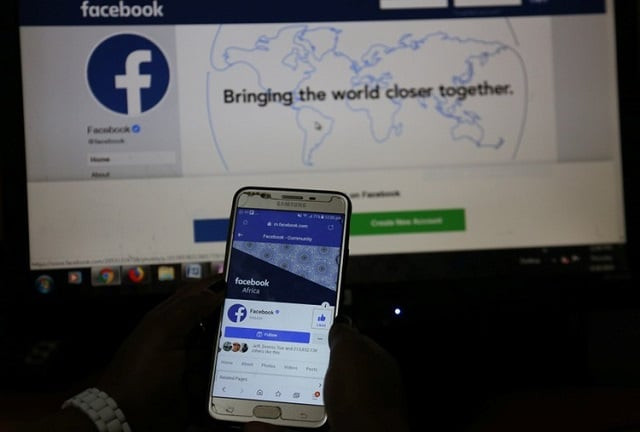Facebook's flood of languages leave it struggling to monitor content
The company offers its 2.3 billion users features in 111 different languages

An illustration photo shows the Facebook page displayed on a mobile phone internet browser held in front of a computer screen at a cyber-cafe in downtown Nairobi, Kenya April 18, 2019.
PHOTO: REUTERS
The company offers its 2.3 billion users features such as menus and prompts in 111 different languages, deemed to be officially supported. Reuters has found another 31 widely spoken languages on Facebook that do not have official support.
Detailed rules known as “community standards,” which bar users from posting offensive material including hate speech and celebrations of violence, were translated in only 41 languages out of the 111 supported as of early March, Reuters found.
Facebook’s 15,000-strong content moderation workforce speaks about 50 tongues, though the company said it hires professional translators when needed. Automated tools for identifying hate speech work in about 30.
Facebook paid teens to track smartphone use
The language deficit complicates Facebook’s battle to rein in harmful content and the damage it can cause, including the company itself. Countries including Australia, Singapore and the UK are now threatening harsh new regulations, punishable by steep fines or jail time for executives if it fails to promptly remove objectionable posts.
The community standards are updated monthly and run to about 9,400 words in English.
Monika Bickert, the Facebook vice president in charge of the standards, has previously told Reuters that they were “a heavy lift to translate into all those different languages.”
A Facebook spokeswoman said this week the rules are translated case by case depending on whether a language has a critical mass of usage and whether Facebook is a primary information source for speakers. The spokeswoman said there was no specific number for critical mass.
She said among priorities for translations are Khmer, the official language in Cambodia, and Sinhala, the dominant language in Sri Lanka, where the government blocked Facebook this week to stem rumors about devastating Easter Sunday bombings.
Facebook taps user data to defend workers from threat
A Reuters report found last year that hate speech on Facebook that helped foster ethnic cleansing in Myanmar went unchecked in part because the company was slow to add moderation tools and staff for the local language.
Facebook says it now offers the rules in Burmese and has more than 100 speakers of the language among its workforce.
The spokeswoman said Facebook’s efforts to protect people from harmful content had “a level of language investment that surpasses most any technology company.”
But human rights officials say Facebook is in jeopardy of a repeat of the Myanmar problems in other strife-torn nations where its language capabilities have not kept up with the impact of social media.



















COMMENTS
Comments are moderated and generally will be posted if they are on-topic and not abusive.
For more information, please see our Comments FAQ